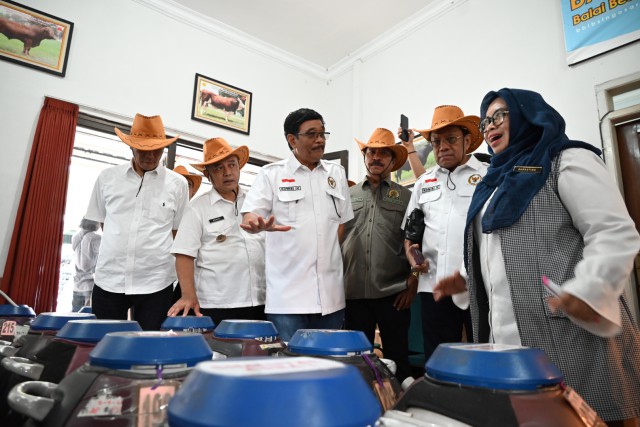Successful Artificial Insemination at BBIB Singosari, Commission IV Optimistic About Meeting the Protein Needs of the Community

Member of the Commission IV of the Indonesian House of Representatives, Djarot Saiful Hidayat, appreciates the efforts to accelerate the increase in livestock population carried out by BBIB (Balai Besar Inseminasi Buatan) Singosari and CV. Kambing Burja, Lawang. He believes that this success can help meet the protein needs of the Indonesian society.
"Here, there are millions of superior offspring, both cows and goats, ready to be sent all over Indonesia. So, they produce really good and tested semen, and have obtained the Indonesian National Standard (SNI). Since Indonesia is still dependent on large meat and milk imports, that's why Commission IV needs to come here to see the potential, and this has potential," said Djarot after leading a Specific Working Visit of Commission IV of the Indonesian House of Representatives to Malang, East Java, on Wednesday, July 5, 2023.
A similar sentiment was also expressed by Member of the Commission IV of the Indonesian House of Representatives, Ibnu Multazam, who saw the productivity of BBIB Singosari, Malang, as deserving of appreciation and quality improvement to meet the needs for milk and meat in Indonesia, which has been heavily reliant on imported products.
"Our observations show that the parent cows can produce around 20,000 frozen semen per day, so if accumulated annually, it's approximately around 3,500,000. Well, that's actually enough to provide AI (Artificial Insemination) for both cows and goats in Indonesia. So, in order to maintain this, to improve the quality of production from BBIB Malang, and to increase its quantity, to prepare for self-sufficiency in meat," Ibnu said.
Although these efforts deserve appreciation, Ibnu Multazam also reminded BBIB Singosari to prioritize meeting domestic AI (Artificial Insemination) needs over exporting to other countries. This would ensure that the protein needs from cows and meat are met, with a significant population of superior cattle.
"For export, it should be our last resort. Let's first meet the domestic needs. Because no matter how cool it may seem to increase exports, it increases the population of cattle in the exporting country of semen. What's even cooler is not exporting to meet AI needs domestically. Thus, the domestic population will have a balance between meat needs and cattle availability," he concluded. (syn/aha)



